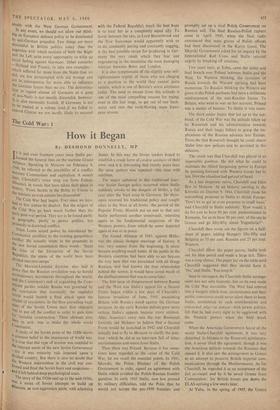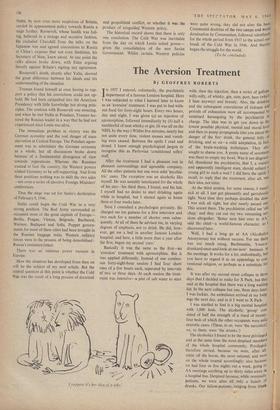The Cold War : 1
How it Began
By DESMOND DONNELLY, MP
Ir is just over fourteen years since Stalin per- f°rnled the funeral rites on the wartime Grand Alliance. Speaking in Moscow on February 9, 1946, he referred to the possibility of a conflict between Communism and capitalism. A month later, Churchill's voice rang out from Fulton, Missouri, in words that have taken their place in hist°rY, 'From Stettin in the Baltic to Trieste in thC Adriatic an iron curtain has descended.' The Cold War had begun. Ever since we have had to live within its shadow. But the origins of the Cold War go back much further than the early post-war period. They are to be found partly In geography, partly in power politics, but Primarily in doctrinal conflict.
When Lenin seized power he introduced the C°Mmunist corollary to the existing geopolitical Conflict. He actually wrote in the preamble to Lhe new Soviet constitution these words : 'Since Iisne time of the formation of the Soviet 'cePublics, the states of the world have been divided into two camps.' , The Marxist-Leninist doctrine also laid it unvyn that the Russian revolution was to herald revolutionary movements throughout the world; and the Comintern's task of organising the Corn- parties outside Russia was governed by the conviction that eventually the capitalist World would launch a final attack upon the Citadel of revolution. In the then prevailing weak state of the Soviet Union their first objective f\vas to put off the conflict in order to gain time Cr 'socialist construction.' Their ultimate aim, then as now, was to make the whole world Communist.
A study of the Soviet press of the 1920s shows a Constant belief in the imminence of world war. It is true that this type of tension was essential to the internal needs of the new Soviet Government 'for it was minority rule imposed upon a divided country. But there is also no doubt that .the Western intervention in the civil war con- nrtned and fired the Soviet fears and suspicions-- 1nd it left behind deep psychological scars. The story of the 1920s and up to the mid-1930s, Was a series of Soviet attempts to build up if inances, or non-aggression pacts, with adjoining States. In this way the Soviet leaders hoped to establish a crude form of cordon sanitaire of their own; and it is interesting that twenty years later the same pattern was repeated—this time with satellites.
The major upheaval in this traditional inter- war Soviet foreign policy occurred when Stalin suddenly awoke to the dangers of Hitler, a full year after the Nazi coup in Germany. He there- upon reversed his traditional policy and sought allies in the West at all levels—the period of the Popular Front. Munich put an end to that and Stalin performed another somersault, returning again to his fundamental suspicions of the Western powers, from which he never departed again in war or in peace.
The Grand Alliance of 1941, against Hitler, was the classic shotgun marriage of history. It was very uneasy from the beginning. It never became anything much better. If the public in the Western countries had been able to see beyono the rosy haze that was associated with all things Russian, and had known the true relationship behind the scenes, it would have saved much of the disillusionment that was to come later.
The first issue of disagreement between Russia and the West was Stalin's appeal for a Second Front, begun within a few days of Churchill's famous broadcast of June, 1941, associating Britain with Russia's stand against the German invasion. As the early Russian defeats grew more serious Stalin's appeals became more strident. After America's entry into the war Roosevelt foolishly led Molotov to believe that a Second Front would be launched in 1942 and Churchill actually had to fly to Moscow to clarify the posi- tion -which he did at an interview full of bitter recriminations and sneers from Stalin.
Then there was Poland. Because it has some- times been regarded as the cause of the Cold War, let me recall the essential points. In 1941, Sikorski, the Prime Minister of the Polish Government in exile, signed an agreement with Stalin which avoided the Polish-Russian frontier question. In early 1943 Stalin, now less pressed by military difficulties, told the Poles that he would not accept the pre-I939 frontiers and promptly set up a rival Polish Government on Russian soil. The final Russian-Polish rupture came in .april, 1943, when the Nazi radio announced that mass graves of Polish officers had been discovered in the Katyn forest. The Sikorski Government asked for an inquiry by the International Red Cross and Stalin retorted angrily by breaking off relations.
Two years later, at Yalta, came the wider and final breach over Poland between Stalin and the West. To Western thinking, the cynicism of Russia towards the Warsaw uprising had been monstrous. To Russian thinking the Western aid given to the Polish partisans had been a deliberate reinforcement of the anti-Russian forces. To Britain, who went to war on her account, Poland was a matter of honour. To Stalin it was more.
The third major factor that led up to the out- break of the Cold War was the attitude taken up by Roosevelt and his administration towards Russia and their tragic failure to grasp the im- plications of the Russian advance into Europe. From the first Roosevelt thought he could charm Stalin into new policies and he persisted in this delusion.
The result was that Churchill was placed in an impossible position. He did what he could to maintain the Allied bargaining power in Europe by pressing forward with Western troops but by late 1944 the situation had got out of hand.
As a last desperate move, Churchill and Eden flew to Moscow. At an historic meeting in the Kremlin on October 9, 1944, Churchill made his astonishing proposal to Stalin to divide Europe. 'Don't let us get at cross purposes in small ways,' said Churchill to Stalin suddenly. 'How would it do for you to have 90 per cent. predominance in Rumania, for us to have 90 per cent, of the say in Greece and go fifty-fifty about Yugoslavia?'
Churchill then wrote out the figures on a half- sheet of paper, adding Hungary fifty-fifty and Bulgaria as 75 per cent. Russian and 25 per cent. Western.
Churchill thew the paper across. Stalin took out his blue pencil and made a large tick. There was a long silence. The paper lay on the table until Churchill suggested that they should burn it. `No, said Stalin. 'You keep it.'
Seen in retrospect, the Churchill-Stalin arrange- ment was not only fantastic, but on its own made the Cold War inevitable. The West had entered into a bargain which time, circumstance and their public conscience could never allow them to keep. Stalin, uninhibited by such considerations and concerned only—as always—with power politics, felt that he had every right to be aggrieved with the Western powers when the final break came.
When the American Government heard of the secret Stalin-Churchill agreement, it was very disturbed. In fairness to the Roosevelt administra- tion, it never liked the agreement; though it was the American attitude towards the Russians that caused it. It also saw the arrangement in Greece as an attempt to preserve British imperial com- munications through the Mediterranean. As for Churchill, he regarded it as an acceptance of the fait accompli and by it he saved Greece from Communism : for British troops put down the ELAS uprising a few weeks later.
At Yalta, in the spring of 1945, the United States, by now even more suspicious of Britain, carried its appeasement policy towards Russia a stage further. Roosevelt, whose health was fail- ing, behaved in a strange and secretive fashion. He excluded Churchill from the talks on the Japanese war and agreed concessions to Russia at China's expense that not even Stettinius, his Secretary of State, knew about. At one point the talks almost broke down, with Eden arguing fiercely against Britain's signing any agreement.
Roosevelt's death, shortly after Yalta, showed the great difference between his ideals and his understanding of the situation.
Truman found himself at once having to sup- port a policy that his convictions could not up- hold. He had been catapulted into the American Presidency with little knowledge but strong prin- ciples. The contrast with Roosevelt was amazing, and when he met Stalin at Potsdam, Truman lec- tured the Russian leader in a way that he had not experienced since Lenin was alive.
The immediate problem in victory was the German economy and the real danger of mass starvation in Central Europe. The Potsdam agree- ment was to administer the German economy as a whole, but all discussions broke down because of a fundamental divergence of view towards reparations. Whereas the Russians wanted to loot the country, the Western powers wished Germany to be self-supporting. And from these positions nothing was to shift the two sides —not even a series of abortive Foreign Ministers' conferences.
Thus the stage was set for Stalin's declaration of February 9,1946.
Stalin could begin the Cold War in a very strong position. The Red Army surrounded or occupied most of the great capitals of Europe— Berlin, Prague, Vienna, Belgrade, Bucharest, Warsaw, Budapest and Sofia. Puppet govern- ments for most of these cities had been brought in the Russian baggage train. Western military forces were in the process of being demobilised : Russia's remained intact.
There was an ominous power vacuum in Europe.
How the situation has developed from then on will be the subject of my next article. But the central question at this point is whether the Cold War was the result of a long process of doctrinal '1 suppose it's her idea of a joke.' and geopolitical conflict, or whether it was the product of misguided Western policy.
The historical record shows that there is only one conclusion. The Cold War was inevitable from the day on which Lenin seized power— given the consolidation of the new Soviet Government. Whilst certain Western policies were quite wrong, they did not alter the basic Communist doctrine of the two camps and world domination by Communism, followed relentlessly for the whole period from 1917 to the actual out. break of the Cold War in 1946. And therebY began the struggle for the world.
(To be concluded)







































 Previous page
Previous page